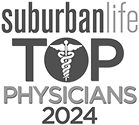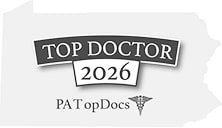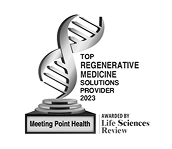Knee Pain Treatment
Knee pain can arise from overuse, injury, or degeneration that disrupts the joint’s stability and function. At Meeting Point Health, we treat knee pain at its source using regenerative therapies such as PRP, Prolotherapy, and Stem Cell Therapy to repair tissue and restore balance. Our goal is to relieve pain, improve mobility, and help you stay active with stronger, healthier knees.
Regenerative Medicine Can Treat These Common Knee Pain Symptoms
If you’re experiencing these symptoms, it’s important to seek an evaluation to determine the best course of treatment. You may be able to avoid surgery with regenerative therapy for your knees. At Meeting Point Health, we specialize in personalized care and natural knee pain treatment to reduce pain, restore mobility, and prevent further damage.
- Pain when resting and during movement that is either localized or systemic
- Stiffness
- Limited range of motion
- Instability
- Localized swelling
- “Locking” sensation
- A loud popping sound
Knee Injuries That Regenerative Medicine Can Heal
- Meniscus Tear
- ACL injuries
- Knee Bursitis
- Patellofemoral syndrome
- Knee Tendonitis
- Collateral ligaments
- Patellar Tendonitis
- Osgood–Schlatter disease
- PCL injuries
- Knee Arthritis
- Cartilage defects
- Dislocation
- Sports Injury to Knee
- Knee Fractures
- Iliotibial band syndrome
- Knee Osteoarthritis
- Sprains and Strains
- Housemaid’s knee
Knee Ligament Tears
A ligament tear is an injury to the soft tissue of the ligament, which prevents the individual from moving, pivoting, turning, or twisting the leg. Ligament tears can result from contact (sports events or running) and non-contact activities (changing directions quickly, walking on uneven ground, or landing from jumping). The symptoms of a torn ligament can be painful, including swelling, inflammation, and tenderness around the injury site. Once the injury occurs, it can result in difficulty bearing weight, instability, and popping sounds during movement.
Meniscus Tear
A meniscus tear is a common knee injury that can be caused by trauma to the cartilage or degeneration over time. An acute injury to the meniscus is painful, resulting in swelling, stiffness, instability, weakness, and unusual sounds, such as clicking or popping. A tear will limit mobility and movement. An acute tear could be due to physical activity or knee trauma, such as twisting or pivoting the joint.
On the other hand, a degenerative tear is gradual and the meniscus cartilage weakens and thins over time. It can be due to aging or repetitive movements. As the cartilage deteriorates, it becomes more susceptible to injury. Non-contact trauma, such as walking or running, could result in tears.
Finally, abnormalities in bone structure within the knee joint could result in meniscus tears. Abnormalities could include an uneven weight disposition, being unbalanced when completing physical activities, or improper knee alignment.
Whether the change in structure is acute or gradual, both are painful and limit the motion of the joint.
Osteoarthritis
Osteoarthritis is a degenerative joint disease when the cartilage between the joints breaks down or tears. The bones without the cartilage rub against each other, resulting in friction which is painful and causes stiffness and swelling. As cartilage begins to wear, all the structures of joints including bones, ligaments, and tendons, can be affected by degeneration.
The symptoms experienced can lead to less activity, which results in muscle weakness. With muscle weakness, the shape of the joint begins to alter leading to the stretching of ligaments and tendons. Bone spurs may begin to develop, which changes the shape of the bones in the joint. Bone spurs develop as the body’s way to protect itself, however, they further limit the range of motion and cause pain. Pieces of bone or cartilage can bud off and float within the joint space, as a result, the symptoms are increased.
Certain factors can affect the development of osteoarthritis, such as:
- Aging
- Family history
- Knee injury or surgery history
- Obesity or being overweight
- Involvement in contact activities or sports
- Overuse or repetitive movements (ex. Jumping or running)
Knee Pain Treatment Options in Philadelphia
You are unique and so is your pain. At Meeting Point Health, we know that every knee injury and every healing journey is different. That’s why we take the time to understand your body, your goals, and the root cause of your pain before recommending a path forward. Whether you’re dealing with arthritis, ligament strain, or chronic inflammation, our team will craft a customized treatment plan that fits you. Below are some of the regenerative therapies we may recommend as part of your personalized care plan.
Contact Meeting Point Health today to schedule your personalized consultation and start your journey to relief. Your path to recovery begins here!
Prolotherapy
Prolotherapy is a medical injection procedure. The goal is to relieve pain and promote healing of musculoskeletal conditions, especially those involving ligaments, joints, and tendons Prolotherapy stimulates healing and tissue repair by causing an inflammatory response that increases blood flow and the arrival of immune cells and growth factors to the injection area.
PRP Therapy
Platelet-rich plasma PRP therapy is a medical treatment that involves the use of a patient’s own blood to promote healing and tissue regeneration. Once injected, the growth factors and other bioactive substances in PRP work to accelerate tissue repair, reduce inflammation, and promote the formation of new blood vessels. This helps in reducing pain, improving function, and enhancing the overall healing process.
Stem Cell Therapy
Stem cell injection therapy refers to a medical procedure in which stem cells are harvested and then injected into a localized area on a patient’s body, typically to promote tissue repair, and regeneration, or to treat various medical conditions. Stem cells are unique because they can develop into different types of cells in the body, and they also have the capacity for self-renewal. This makes them valuable in medical treatments, as they can potentially replace or repair damaged or diseased tissues. Stem cell injection therapy can treat arthritic joints, sports injuries, tendinopathies, non-union fractures, meniscal tears, Degenerative Disc Disease, and Osteonecrosis or Avascular Necrosis.
Prolozone
Prolozone therapy is a mixture of ozone gas and a prolotherapy solution is injected into the affected area, often around joints, ligaments, or tendons. The theory is that this combination not only irritates and strengthens the tissues (like prolotherapy) but also delivers the potential therapeutic benefits of ozone, such as improved circulation and tissue oxygenation. Prolozone combines procaine, dextrose, B vitamins, saline, oxygen, and ozone into a damaged joint and the combination allows for regrowth of damaged tissue.
Nerve Hydrodissection
Nerve hydrodissection is a minimally invasive medical procedure involving injecting an anti-inflammatory solution around an entrapped nerve. Injectables such as dextrose, vitamins, peptides, plasma, procaine, and even stem cells are flooded around compressed or irritated nerves. This technique aims to separate the affected nerve from surrounding structures, such as muscles, fascia, or scar tissue, which may be contributing to the pain or dysfunction.
Peptide Therapy
Peptide Therapy can be introduced as an at-home treatment. Peptide therapy introduces peptides to signal communication with our cells to perform a specific response. Administrating peptides elicits a response to regulate or improve physiological functions. For regenerative medicine, peptides for wound recovery, and tissue repair, reduce inflammation, accelerate recovery time, and promote cell migration and differentiation.
Why Patients Choose Meeting Point Health in Philadelphia
Led by Dr. Steve Matta, a triple board-certified physician with expertise in Family Medicine, Sports Medicine and Stem Cell Therapy, Meeting Point Health is the leading integrative health provider in Philadelphia. Both Dr. Matta and Mary Anne Matta are Seeds Scientific Research and Performance (SSRP) Fellows in cellular medicine, providing them with advanced insight into stem cell and other regenerative practices.








